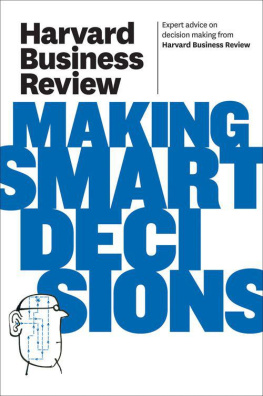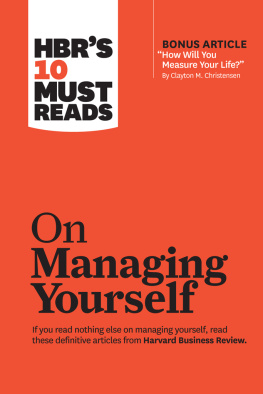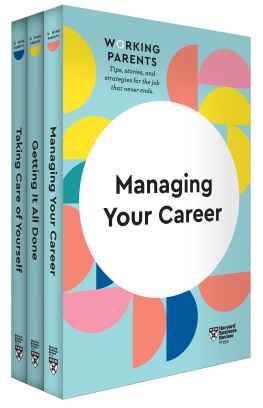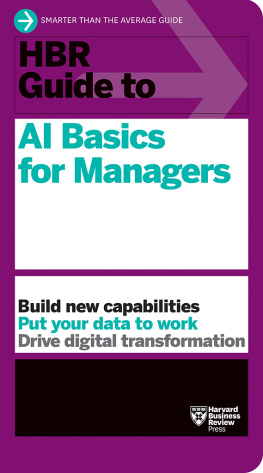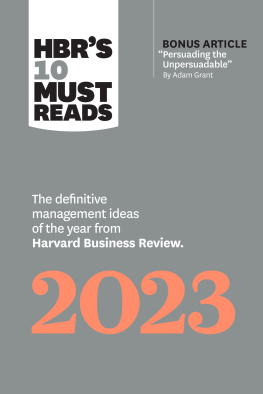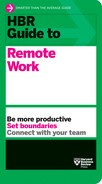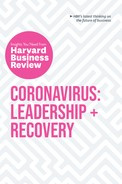Harvard Business Review - The Future of Work: The Insights You Need from Harvard Business
Here you can read online Harvard Business Review - The Future of Work: The Insights You Need from Harvard Business full text of the book (entire story) in english for free. Download pdf and epub, get meaning, cover and reviews about this ebook. year: 2021, publisher: Harvard Business Review Press, genre: Politics. Description of the work, (preface) as well as reviews are available. Best literature library LitArk.com created for fans of good reading and offers a wide selection of genres:
Romance novel
Science fiction
Adventure
Detective
Science
History
Home and family
Prose
Art
Politics
Computer
Non-fiction
Religion
Business
Children
Humor
Choose a favorite category and find really read worthwhile books. Enjoy immersion in the world of imagination, feel the emotions of the characters or learn something new for yourself, make an fascinating discovery.

- Book:The Future of Work: The Insights You Need from Harvard Business
- Author:
- Publisher:Harvard Business Review Press
- Genre:
- Year:2021
- Rating:5 / 5
- Favourites:Add to favourites
- Your mark:
- 100
- 1
- 2
- 3
- 4
- 5
The Future of Work: The Insights You Need from Harvard Business: summary, description and annotation
We offer to read an annotation, description, summary or preface (depends on what the author of the book "The Future of Work: The Insights You Need from Harvard Business" wrote himself). If you haven't found the necessary information about the book — write in the comments, we will try to find it.
Harvard Business Review: author's other books
Who wrote The Future of Work: The Insights You Need from Harvard Business? Find out the surname, the name of the author of the book and a list of all author's works by series.
The Future of Work: The Insights You Need from Harvard Business — read online for free the complete book (whole text) full work
Below is the text of the book, divided by pages. System saving the place of the last page read, allows you to conveniently read the book "The Future of Work: The Insights You Need from Harvard Business" online for free, without having to search again every time where you left off. Put a bookmark, and you can go to the page where you finished reading at any time.
Font size:
Interval:
Bookmark:
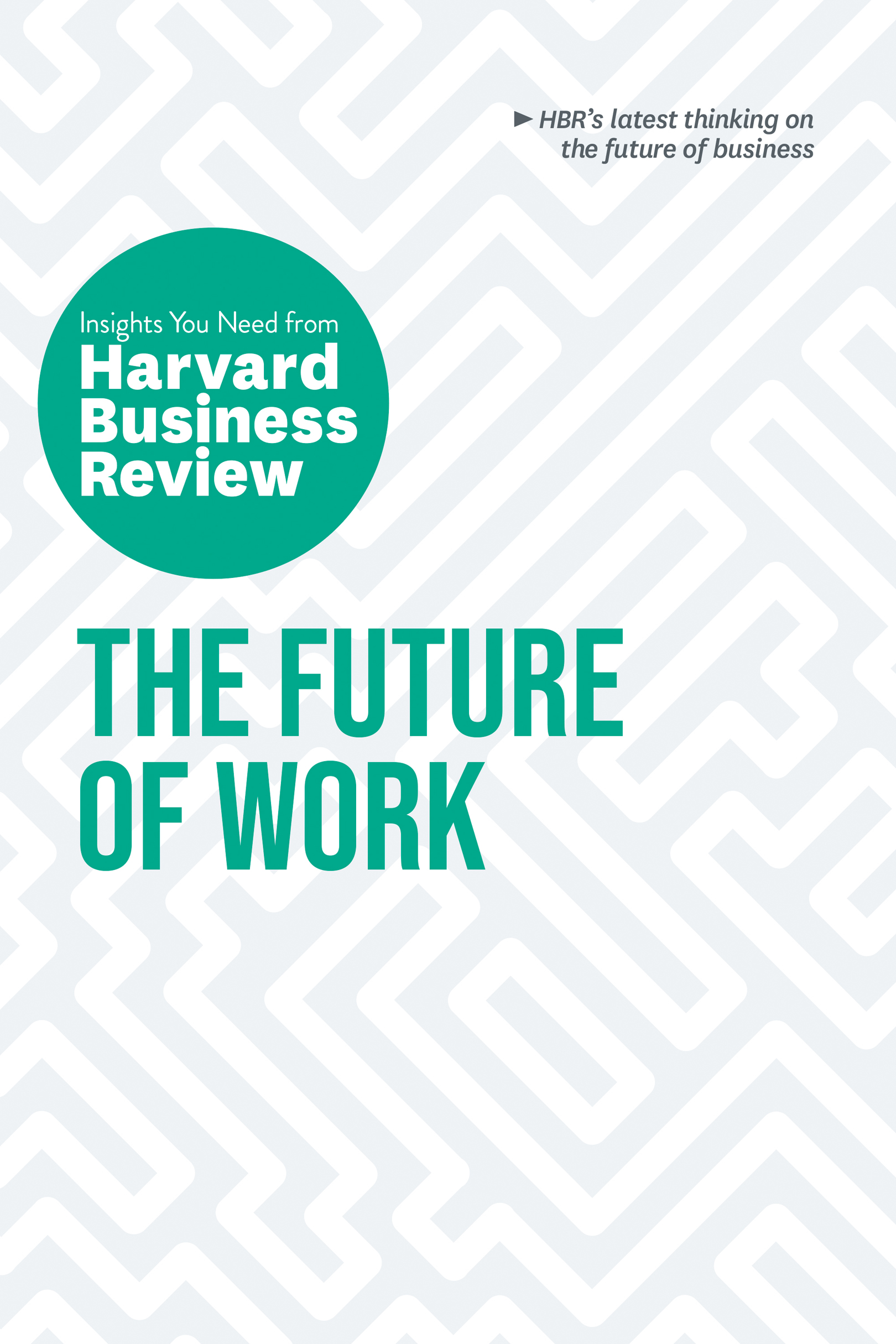
Insights You Need from Harvard Business Review
Business is changing. Will you adapt or be left behind?
Get up to speed and deepen your understanding of the topics that are shaping your companys future with the Insights You Need from Harvard Business Review series. Featuring HBRs smartest thinking on fast-moving issuesblockchain, cybersecurity, AI, and moreeach book in this series provides the foundation introduction and practical case studies your organization needs to compete today and collects the best research, interviews, and analysis to get it ready for tomorrow.
You cant afford to ignore how these issues will transform the landscape of business and society. The Insights You Need series will help you grasp these critical ideasand prepare you and your company for the future.
Books in the series include:
Agile
Artificial Intelligence
Blockchain
Climate Change
Coronavirus: Leadership and Recovery
Customer Data and Privacy
Cybersecurity
The Future of Work
Global Recession
Monopolies and Tech Giants
Racial Justice
Strategic Analytics
The Year in Tech, 2021
The Year in Tech 2022

THE FUTURE OF WORK
Harvard Business Review Press
Boston, Massachusetts
HBR Press Quantity Sales Discounts
Harvard Business Review Press titles are available at significant quantity discounts when purchased in bulk for client gifts, sales promotions, and premiums. Special editions, including books with corporate logos, customized covers, and letters from the company or CEO printed in the front matter, as well as excerpts of existing books, can also be created in large quantities for special needs.
For details and discount information for both print and
ebook formats, contact ,
tel. 800-988-0886, or www.hbr.org/bulksales.
Copyright 2021 Harvard Business School Publishing Corporation
All rights reserved
No part of this publication may be reproduced, stored in or introduced into a retrieval system, or transmitted, in any form, or by any means (electronic, mechanical, photocopying, recording, or otherwise), without the prior permission of the publisher. Requests for permission should be directed to , or mailed to Permissions, Harvard Business School Publishing, 60 Harvard Way, Boston, Massachusetts 02163.
The web addresses referenced in this book were live and correct at the time of the books publication but may be subject to change.
Library of Congress Cataloging-in-Publication Data
Names: Harvard Business Review Press, issuing body.
Title: The future of work.
Other titles: Future of work (Harvard Business Review Press) | Insights you need from Harvard Business Review.
Description: Boston, Massachusetts : Harvard Business Review Press, [2021] | Series: Insights you need from Harvard Business Review | Includes index.
Identifiers: LCCN 2021021329 (print) | LCCN 2021021330 (ebook) | ISBN 9781647822286 (paperback) | ISBN 9781647822293 (ebook)
Subjects: LCSH: Quality of work life. | Corporate culture. | Diversity in the workplace. | Work environmentMoral and ethical aspects.
Classification: LCC HD6955 .F854 2021 (print) | LCC HD6955 (ebook) | DDC 658.3/12dc23
LC record available at https://lccn.loc.gov/2021021329
LC ebook record available at https://lccn.loc.gov/2021021330
ISBN: 978-1-64782-228-6
eISBN: 978-1-64782-229-3
- Your organization must adaptthere is no going back.
- by Brian Kropp
- Best practices to make it possible.
- by Prithwiraj (Raj) Choudhury
- Create an open, safe, and inclusive environment.
- by Deborah Grayson Riegel
- They make us calmer, healthier, and happier.
- by Bea Boccalandro
- Build your talent platform strategy.
- by Joseph Fuller, Manjari Raman, Allison Bailey, and Nithya Vaduganathan
- A four-phase approach to implementing AI.
- by Boris Babic, Daniel L. Chen, Theodoros Evgeniou, and Anne-Laure Fayard
- A practical road map to fostering anti-racist practicesat all levels.
- by Erin Dowell and Marlette Jackson
- Diversity is not enough on its own.
- by Michael Slepian
- Companies must move beyond box-checking and window-dressing.
- by George Serafeim
- Let corporate purpose lead the way.
- by Frank Cooper III and Ranjay Gulati
THE NEW WORLD OF WORK
by Brian Kropp
In just a handful of months, the relationship between employers and employees has fundamentally transformed due to several factors. The impact of the social justice movement, the Covid-19 pandemic, and digital evolution have dramatically accelerated the pace of change. Leaders who think that what has happened across the last year has been a blip, and that we will return to normal, are wrong. Much like heating water, this transformation is the result of factors that have been at playslowly heating upfor years, and then in 2020 hit a full boil. The changes we have experienced, and will continue to experience, represent a fundamental shift to a new, different relationship between employees and employers. There is no going back.
The new deal between employees and employers will be redefined along a series of three dimensions: creating a shared purpose, radical flexibility, and deeper connections. The result will be organizations driving social change and improving diversity, equity, and inclusion (DE&I) efforts; employees exerting more control over where, when, and how much they work; and employers becoming more involved in supporting the life experiencenot just the employment experienceof their employees.
To create a more diverse, equitable, and inclusive organization, leaders must go beyond corporate messages to real behavior change. In order to drive DE&I in their organization, executives must model the right behaviors. But this is only step one: Executives must do more; they must use their budget, systems, and processes to drive DE&I throughout the organization.
Improving DE&I efforts within the four (virtual) walls of your organization is laudable, but your workforce expects more; three-quarters of employees expect their employer to take a stance on current societal and cultural issues, even if those issues have nothing to do with their business. CEOs commonly get involved by issuing a corporate statement in response to these issues. However, research has found that only issuing a corporate statement degrades employee engagement versus the status quo of doing nothing at all. Instead, when organizations put actions behind their wordsby reallocating resources, changing suppliers, giving employees time off to volunteer, and explaining these movesthe number of highly engaged employees increases. This is true even for employees who disagree with the organizations stance on the issue; while they might disagree, they at least know why the decision was made.
Progressive organizations have embraced the idea of radical flexibilitygiving employees control over where, when, and how much they workto meet the desires of employees and realize the potential financial benefits of a hybrid workforce. Research shows that when employees are able to choose where, when, and how much they work, the number of high performers in a company can increase by as much as 19%. Now the question is: How do we redesign work to achieve this? While experiments are playing out across companies, one of the major lessons is that leaders must shift to a much greater emphasis on the output employees achieve rather than the systems and processes they use to achieve it.
Font size:
Interval:
Bookmark:
Similar books «The Future of Work: The Insights You Need from Harvard Business»
Look at similar books to The Future of Work: The Insights You Need from Harvard Business. We have selected literature similar in name and meaning in the hope of providing readers with more options to find new, interesting, not yet read works.
Discussion, reviews of the book The Future of Work: The Insights You Need from Harvard Business and just readers' own opinions. Leave your comments, write what you think about the work, its meaning or the main characters. Specify what exactly you liked and what you didn't like, and why you think so.

